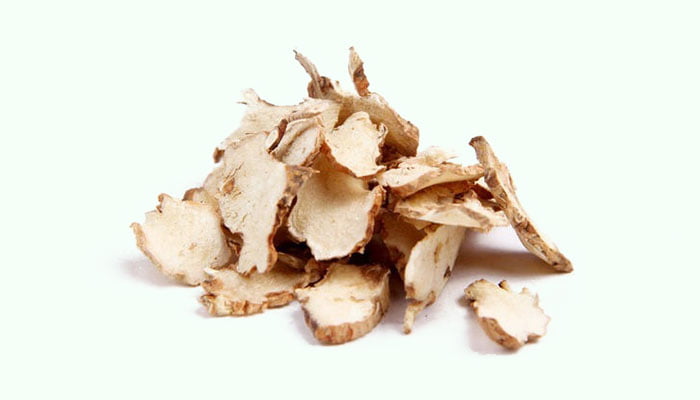What Is Zhi Mu
Zhi Mu commonly known as Rhizoma Anemarrhenae is the rhizome of Anemarrhena asphodeloides, which is a perennial herb belonging to the family Liliaceae. It is a relatively practical and common Chinese herbal medicine, which first appeared in <Shennong Ben Cao Jing> in the late Western Han Dynasty (around 100 BCE).
Anemarrhena asphodeloides are highly adaptable and often grow on sunny hillsides, grasslands, or roadside drier places below 1,450 meters above sea level. They grow well in well-drained, loose humus soil. They are mainly distributed in northern China, Mongolia, and North Korea.
In spring and autumn, people gather the rhizomes of Anemarrhena asphodeloides, remove the sand, mud, and their fibrous roots, dry them in the sun, cut them into slices, use them directly, or stir-fry them with saltwater, and make them into Chinese herbal medicines.

Zhi Mu contains sarsasapogenin, markosapogenin, negitogenin, diosgenin, spirostanol glycosides, timosaponin N, timosaponin O, mangiferin, isomangiferin, neomangiferin, baohuoside, icariin, anemaran A-D, phenylpropanoids, phenols, anthraquinones, alkaloids, amino acids, volatile oils, organic acids, trace elements, and a large amount phlegmatic temperament.
Generally, the yellow-brown or brown and fragile Zhi Mu with a yellow-white or yellow cross-section is preferred.
According to the Chinese Pharmacopoeia, the medicinal nature of Zhi Mu is relatively cold, with a bitter and sweet taste. It has a certain therapeutic effect on the pathological changes of the lung, stomach, and kidney meridians.
In traditional Chinese medicine, it is often used to clear heat and purge fire, promote the production of body fluid and moisturize dryness, and treat high fever, polydipsia, night sweats, hot flashes, coughs, enlarged prostate, scalp perifollicular inflammation, type 2 diabetes, primary nephrotic syndrome, muscle fiber pain syndrome, and constipation.
There are about 300 kinds of Chinese medicine prescriptions containing it, such as Bai Hu Tang, Zhi Bai Di Huang Wan, Er Xian Tang, and Da Bu Yin Wan.
Benefits
- Anti-inflammation, inhibiting xylene-induced ear swelling in mice.
- Anti-oxidation, increasing the activity of superoxide dismutase and catalase, reducing the level of malondialdehyde and reactive oxygen species.
- Inhibiting the activity of α-glucosidase and reducing the blood sugar content of alloxan diabetic mice.
- Reducing the content of serum total cholesterol, triglycerides, and low-density lipoprotein in quail with hyperlipidemia.
- Reducing the area of arterial plaque and treating atherosclerosis.
- Inhibiting platelet aggregation induced by adenosine diphosphate, 5-hydroxytryptamine, or arachidonic acid.
- Improving the learning and memory ability of aging model mice, and treating memory decline and cognitive decline caused by Alzheimer’s disease.
- Promoting the production of body fluid, treating high fever and polydipsia caused by febrile diseases.
- Moisturizing lung dryness, treating chronic cough and shortness of breath caused by dryness and heat of the lung.
- Nourishing kidney yin, treating hectic fever, hot flashes, night sweats, and dysphoria caused by hyperactivity of fire due to yin deficiency.
- Purging lung fire and stomach fire, treating polydipsia, hyperdiuresis, overeating with marasmus, fatigue, high blood sugar, and urine sugar caused by internal heat due to yin-deficiency.
- Nourishing yin and moisturizing dryness, treating constipation caused by yin deficiency and dryness heat.
- Inhibiting the growth of lung cancer cell A549, pancreatic cancer cell Panc-1, and breast cancer cell MCF-7, and inducing apoptosis of HL-60 cells.
- Timosaponin has estrogen-like effects, which can improve postmenopausal osteoporosis in women.
- Its decoction can inhibit Shigella, Typhoid, Paratyphi, Vibrio cholerae, Escherichia coli, Proteus, Diphtheria,
- Staphylococcus, Pneumococcus, β-hemolytic streptococcus, and Candida albicans.
- Studies have found that its total saponins can reduce the release of endothelin 1, enhance the expression of endothelial nitric oxide synthase, and have a protective effect on cerebral ischemia-reperfusion injury.
Combinations
- It can be used in combination with Shi Gao (Gypsum), Jing Mi (Japonica Rice), Gan Cao (Licorice Root), etc. to treat high fever and polydipsia caused by febrile diseases.
- It can be used in combination with Xing Ren (Semen Armeniacae), and Lai Fu Zi (Radish Seed), etc. to treat chronic cough and shortness of breath caused by lung dryness.
- It can be used in combination with Huang Bai (Cortex Phellodendri), Sheng Di Huang (Radix Rehmanniae), etc. to treat hectic fever, hot flashes, night sweats, and dysphoria caused by hyperactivity of fire due to yin deficiency.
- It can be used in combination with Tian Hua Fen (Radix Trichosanthis), Ge Gen (Kudzu Root), etc. to treat polydipsia, hyperdiuresis, overeating with marasmus, fatigue, high blood sugar, and urine sugar caused by internal heat due to yin-deficiency.
- It can be used in combination with Sheng Di Huang (Radix Rehmanniae), Xuan Shen (Radix Scrophulariae), Mai Dong (Radix Ophiopogonis), etc. to treat constipation caused by yin deficiency and dryness heat.
Topical application of it and a lotion made from Xia Ku Cao (Spica Prunellae) to treat scalp peri-follicle inflammation.
Side Effects
- At present, no data is showing that Zhi Mu has toxic effects, and there are no reports of serious adverse reactions when it is taken according to the prescribed dose.
- Overdose may cause diarrhea.
Precautions and Warnings
- The dosage of Zhi Mu should be controlled at 6-12g.
- It can be made into decoctions, medicated liquors, or lotions.
- People who are allergic to Zhi Mu should not take it.
- It should not be taken at the same time as dexamethasone.
- Patients with loose stools due to deficiency in the spleen should not take it.
- Pregnant women and breastfeeding women should take it under the guidance of a doctor.
- The unprocessed Zhi Mu is often used to clear heat and purge fire, and the stir-fried Zhi Mu with saltwater is often used to nourish yin and lower fire.
